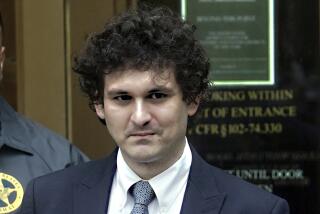E-mails reveal Goldman Sachs trader’s trepidations, distractions
Reporting from New York — The young Goldman, Sachs & Co. trader at the center of the government’s civil fraud case against the firm was aware of problems with the complex financial products he was working on, e-mails released by the company indicate.
In one of the messages, Fabrice Tourre, the only individual defendant in the case, called the controversial transaction that is the subject of the suit “a product of pure intellectual masturbation” and an “absolutely conceptual” invention without purpose.
When Goldman employees, including Chief Executive Lloyd Blankfein, show up to testify before a Senate panel Tuesday, perhaps none’s appearance will be more highly anticipated than that of the 31-year old Tourre.
Known for the “fabulous Fab” moniker he gave himself in an e-mail quoted in the Securities and Exchange Commission’s complaint, Tourre has kept out of sight since the suit was filed in federal court in Manhattan on April 16. But the correspondence released by the company over the weekend provides a glimpse of his thoughts in 2007 as he worked in New York on a Goldman deal called Abacus 2007-AC1, which created a large chunk of ultimately toxic mortgage-backed securities.
The messages also depict a brash but thoughtful and self-deprecating Frenchman who corresponded romantically with two women while devoting his time to the Abacus transaction.
“There is nothing fabulous abt me, just kindness, altruism and deep love for some gorgeous and super-smart French girl in London,” he wrote to a Goldman employee in London.
Tourre grew up in a Parisian suburb and attended a prestigious engineering school before going on to study at Stanford, social networking websites indicate. A year after the Abacus deal closed, Goldman promoted him from vice president to executive director and transferred him to London from New York.
The SEC’s complaint accuses Tourre and Goldman of selling Abacus securities to European banks without telling them that a hedge fund, Paulson & Co., had been allowed to help choose the portfolio of mortgage bonds underlying Abacus. The hedge fund was betting against the bond portfolio in an inherent aspect of the Abacus deal and eventually made a profit on the deal of about $1 billion, the same amount that the European banks lost on it.
Goldman has denied any wrongdoing. Since the suit was filed, Tourre has been put on paid leave and Goldman has withdrawn his registration with British financial regulators.
In one e-mail, Tourre, then 28, was critical of the “synthetic” nature of Abacus, which wouldn’t be buying actual bonds but would instead sell, in effect, insurance on mortgage-backed securities. He called the arrangement “the type of thing which you invent telling yourself: ‘Well, what if we created a “thing,” which has no purpose, which is absolutely conceptual?’ ”
In another message, however, he wrote: “Not feeling too guilty about this. The real purpose of my job is to make capital markets more efficient and ultimately provide the US consumer with more efficient ways to leverage and finance himself, so there is a humble, noble and ethical reason for my job ;)”
But he immediately seemed to doubt his upbeat conclusion, saying it was “amazing how good I am in convincing myself!!!”
The e-mails suggest the harried lifestyle of a Goldman trader.
“I’m still stuck at work at 10PM, but it’s been six years since I’ve been functioning on this @!$@!&@$# schedule, so who cares,” Tourre wrote. “I’ve decided two more years of work and I’m retiring.”
Despite his schedule, Tourre found time to communicate with objects of his affection.
In February 2007, soon after he met with a Paulson & Co. representative about the Abacus deal, Tourre sent a romantic message, mostly in French, to Fatiha Boukhtouche, a neuroscience researcher at Columbia University. A few weeks later, he was writing similarly sweet words — in English — to Marine Serres, a Goldman employee in London.
Boukhtouche and Serres couldn’t be reached for comment Monday.
The e-mails intimate that it was Tourre’s romantic relationships that kept him going. In one message to Boukhtouche, he wrote:
“I believe that a soft and sensual feminine intervention is necessary for Fab’s survival.”
More to Read
Inside the business of entertainment
The Wide Shot brings you news, analysis and insights on everything from streaming wars to production — and what it all means for the future.
You may occasionally receive promotional content from the Los Angeles Times.










